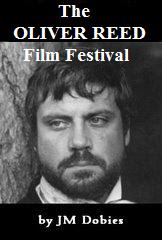 My favorite Oliver Reed film is 1967's I'll Never Forget What's 'Isname, directed by Michael Winner. I first saw this movie on Canadian TV on the midnight movie on CJOH and it has stuck in my head ever since. Back then, I enjoyed it for the psychedelic dream sequences, the dolly birds, and the good ol' "frank sexuality." Watching it again on DVD thirty years later, I find it still resonates, but for different reasons.
My favorite Oliver Reed film is 1967's I'll Never Forget What's 'Isname, directed by Michael Winner. I first saw this movie on Canadian TV on the midnight movie on CJOH and it has stuck in my head ever since. Back then, I enjoyed it for the psychedelic dream sequences, the dolly birds, and the good ol' "frank sexuality." Watching it again on DVD thirty years later, I find it still resonates, but for different reasons.The films begins with Reed, as hotshot commerical filmmaker Andrew Quint, walking purposefully down the streets of London with an axe over his shoulder. When he reaches his office at the Lute Organisation, a large advertising firm, he proceeds to chop his desk to pieces, then tenders his resignation to his Machiavellian boss, Jonathan Lute, played by the one and only Orson Welles.
QUINT: I'm going to find an honest job.
LUTE: Silly boy. There aren't any.
And so begins Andrew's journey, the rejection of his entire way of life, which includes breaking up with his two mistresses (Marianne Faithfull, Lynn Ashley) and making peace with his estranged wife (Wendy Craig). He takes a job at a failing literary journal where he gets involved with yet another woman, the innocent Georgina (Carol White).

The film deftly juggles drama and comedy, with Welles supplying much of the humor, and was groundbreaking in its portrayal of sexuality. In fact, it was condemned by the Catholic Motion Picture Office upon its US release in 1968, because of a scene that implied that Reed was going down on White, and also because Faithfull screams out the F-word (obscured by traffic noise, but still clear enough to outrage the bluenoses at the time).
The Super-8 commercial Quint makes at the end of the film is still dazzling -- one would think that director Michael Winner would have gone on to greater things, but this film is the best thing he ever did. It is also one of Oliver Reed's finest performances, and one of Orson Welles's better roles in his long period of decline. There's a scene towards the end of the film where Reed kicks Welles out of the editing room, a bitter irony that mirrors Orson's being shut out of the post-production process on The Magnificent Ambersons and Touch of Evil.
The supporting performances by White, Craig, and Harry Andrews (in a genuinely creepy role as a dirty-minded poet laureate) are also tip top, as is the script by Peter Draper, an underrated screenwriter who also wrote The System. Francis Lai contributes the eclectic musical score, ranging from the fuzz-guitar-driven main title theme to lush orchestral pieces.
Several other Reed-Winner collaborations, The System (a/k/a The Girl Getters), The Jokers, and Hannibal Brooks, are also well worth a second look.
I'll Never Forget What's 'Isname is definitely worth seeking out, an underappreciated gem from the height of Swinging London, and one of the best British films of the '60s.
 Released on DVD by Anchor Bay Home Entertainment, but it has gone out of print, so shop around for a reasonable price.
Released on DVD by Anchor Bay Home Entertainment, but it has gone out of print, so shop around for a reasonable price.






 From the opening scene, the recurring theme is cruelty: the cruelty of life, the cruelty of fate, and the cruelty of the ruling class, for it is the cruelty of one particularly nasty noble that sets Leon's fate in motion. In his highly insightful essay for Cinemafantastique, Steve Biodrowski writes that The Curse of the Werewolf "plays out like a deliberate piece of Theatre of Cruelty, in which most of the sympathetic characters come to a tragic end. The result is not especially frightening, but undeniably effective, in a depressing sort of way."
From the opening scene, the recurring theme is cruelty: the cruelty of life, the cruelty of fate, and the cruelty of the ruling class, for it is the cruelty of one particularly nasty noble that sets Leon's fate in motion. In his highly insightful essay for Cinemafantastique, Steve Biodrowski writes that The Curse of the Werewolf "plays out like a deliberate piece of Theatre of Cruelty, in which most of the sympathetic characters come to a tragic end. The result is not especially frightening, but undeniably effective, in a depressing sort of way." For further reading, check out Steve Biodrowski's essay on The Curse of the Werewolf at
For further reading, check out Steve Biodrowski's essay on The Curse of the Werewolf at 




